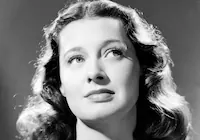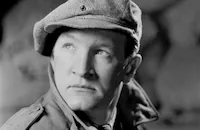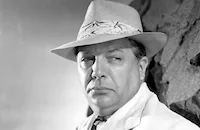Women Without Names
Brief Synopsis
Cast & Crew
Robert Florey
Ellen Drew
Robert Paige
Judith Barrett
John Miljan
Fay Helm
Film Details
Technical Specs

Synopsis
Fred MacNeil, a construction engineer who is new in town, drives up to Pete's Drive-in and is enchanted with the waitress, Joyce King. Later, they take a motorboat ride on a lake, and "Mac" tells her he is being sent to Tennessee and wants to marry her. Joyce confesses she is a divorcee and has been in prison because of her husband, but this does not matter to Fred, and they marry. Walter Ferris, Joyce's ex-husband, returns, followed by a vengeful former moll, Peggy Athens. When they are caught in Joyce's apartment by policeman Ken Reardon, Ferris shoots him, leaving the newlyweds to find the corpse. The couple's conviction is brought about through the machinations of aggressive assistant district attorney John Marlin as part of his campaign for the top job. At the office of Warden Rynex, the couple is separated: Joyce is sent to the women's prison, and Mac is sent to the death house to await execution. Peggy, also imprisoned, spitefully starts a fight with Joyce, who does not know who she is, and allows Joyce to be blamed. When Joyce is sent to isolation in the cell block, her friends, Ruffles McWade, Ivory and the "Countess" ostracize Peggy until she confesses that Ferris shot Reardon. Meanwhile, Marlin's campaign is floundering, so his manager, Hugh Gilman, turns to the issue of prison laxity to win votes. They arrange with a matron named Mrs. Lowry and Grimley, a guard who is jealous of Lennox, to allow Mac and Joyce to momentarily meet for a newspaper photograph. Peggy later shows Joyce the headline, "Our Prisons Pamper Killers, Marlin Charges." Mac's cellmate is executed, and he is to hang the next day. Peggy confesses to Joyce, and she is sent to Marlin, but he refuses to believe her. Joyce pulls the warden's gun on Marlin, and she and Peggy follow him out. After a chase and an automobile accident, Joyce and Peggy get their story to the newspaper. Peggy stages a meeting with Ferris, and the police hear him admit to the killing of Reardon, and he is taken into custody. Joyce and Mac then leave in their trailer for a honeymoon trip to Tennessee.

Director

Robert Florey
Cast

Ellen Drew

Robert Paige
Judith Barrett

John Miljan

Fay Helm
John Mcguire

Louise Beavers
James Seay
Esther Dale

Marjorie Main
Virginia Dabney
Audrey Maynard
Kitty Kelly
Helen Lynch

Mae Busch
Frank M. Thomas
Charles Williams
Cliff Clark
Thomas E. Jackson

Joseph Sawyer
Charles Waldron
Ed Le Saint

Wilfred Lucas
Dick Elliott
Ruth Warren
Harry Worth
Lillian Elliott

Cy Kendall
Weldon Heyburn

James Flavin
Dick Rush
Brenda Fowler
Edward Marr
Calla Birge
Barbara Leonard

Greta Granstedt
Bert Roach
Walter Fenner
George Anderson
Henry Roquemore
John Harmon
Arthur Aylsworth
Leila Mcintyre
Helen Mackellar
Mary Gordon
Garry Owen
Jimmie Dundee
Eddie Fetherston
Allen Fox
Ralph Mccullough
Allen Connor
Jack Egan
Paul Kruger
Sam Ash
Charles Mcavoy
James Kelso
Wilfred Roberts

Douglas Kennedy
Blanche Rose
John Dilson
Edwin Brian
Bill Cartledge
Crew
Anne Bauchens
Hans Dreier
William Flannery
A. E. Freudeman
Harold Hurley
Charles Lang Jr.
William Lebaron
Joe Lefert
William R. Lipman
Horace Mccoy
Gene Merritt
Stuart Thompson
Howard Wilson
Eugene J. Zukor

Film Details
Technical Specs

Articles
Ellen Drew, 1914-2003
She was born Esther Loretta "Terry" Ray on November 23, 1914, in Kansas City, Missouri. The daughter of a barber, her family moved to Chicago when she was still an infant and she lived a very quiet childhood far removed from the glamour of Hollywood. She was encouraged by some friends to enter a beauty contest when she was just 17. After winning, she tried her luck in Hollywood, but found that they were no immediate offers for her particular talents.
She eventually took a waitressing job at C.C. Brown's, a famed Hollywood Boulevard soda fountain, and had virtually abandoned her dreams as a starlet when William Demarest, a popular actor's agent and well-known character actor, spotted her. Demarest arranged a screen test for her at Paramount, and she was promptly placed under contract for $50 a week.
For the first few years, (1936-38), Drew got only bit parts, and was often uncredited. When she finally got prominent billing in the Bing Crosby musical Sing You Sinners (1938), she decided to change her name, from Terry Ray to Ellen Drew. She earned her first major role in Frank Lloyd's If I Were King (1938) opposite Ronald Colman, yet for the most part of her career, rarely rose above "B" material and second leads. Still, she had some fine exceptions: Preston Sturges' enchanting comedy Christmas in July (1940), with Dick Powell; Tay Garnett's lighthearted war romp My Favorite Spy (1942) co-starring Kay Kyser; Julien Duvivier's taut The Imposter (1944), holding her own with a brooding Jean Gabin; and Mark Robson's chilling low-budget chiller Isle of the Dead (1945) opposite Boris Karloff. Drew made some notable television appearances in the late '50s including Perry Mason and The Barbara Stanwyck Show, before retiring from the entertainment industry. She is survived by her son David; five grandchildren; and five great-grandchildren.
by Michael T. Toole

Ellen Drew, 1914-2003
Quotes
Trivia
Notes
This film's early working titles were Strange Money and Women Behind Bars. Ernest Booth's play also served as the basis for Paramount's 1932 Ladies of the Big House. Louise Beavers also portrayed "Ivory" in that film.














